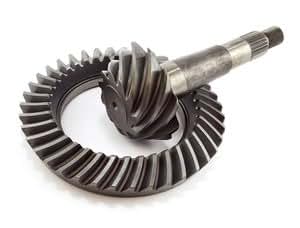Ford Mustang V6 2005-2014: Engine Performance Modifications
The Ford Mustang is known for its great performance out of the factory; however, a few simple mods make it extensively better! Find out how to modify your Mustang below.
This article applies to the Ford Mustang V6 (2005-2014).
You have probably heard someone brag about, or heard them race, with a "bolt-on" Mustang. Usually, bolt-ons include headers, cat-backs, intakes, rear end gears, and a tune. When it comes to best bang for the buck mods on your Ford Mustang, it is hard to go wrong with any of the above options. Part of the fun of owning a Mustang is being able to modify its performance and seeing how much you can improve on what Ford came out with. After all, the Mustang has the largest aftermarket parts industry out of any car in the world! Both the 4.0L and 3.7L respond great to mods, and this article will highlight whether a particular mod makes a greater difference on a certain platform. Read on to find out how to boost the performance in your Pony.
Headers are one of the best upgrades you can do to either of the V6 engines offered by Ford. Traditionally, you have three options for headers, including long tubes, mid-length, and shorty headers.
#1 Headers

DIY Cost – $300-$1,500
Professional Cost – $600-$2,000
Skill Level – Moderate; installing headers takes patience to make them fit right, but the gains are worth every minute!
Replacing your stock exhaust manifolds with headers increases exhaust flow tremendously, and right where you need it. Due to emission laws and sound regulations, Ford has to use restrictive manifolds that rob horsepower. This power is rediscovered by installing nonrestrictive headers. Check your local emissions laws to make sure you are in the clear with installing your choice of headers. Long tubes will provide the best gains, but are not legal in most states including California. The 3.7L responds better to headers than the 4.0L, but they both can benefit tremendously. Recommended only if legal in your state.
#2 Cat-Back Exhausts

DIY Cost – $300-$1,500
Professional Cost – $500-$1,800
Skill Level – Easy; installing a cat-back is simple and only requires a few common tools.
Cat-back exhausts also help reduce restriction in the exhaust system like headers; however, the gains are not as large. The greater benefit of a cat-back is being able to fine tune the sound you want your Mustang to produce. There are tons of choices of an aftermarket cat-back on a V6 Mustang. To find what is best for you, try to find someone with a similar exhaust so you can hear it in person. If not, use YouTube to find sound clips of various exhausts. A 4.0L Mustang will gain more from a cat-back change if you switch to true duals, as the 3.7L Mustang comes with it from the factory. However, a 3.7L Mustang will gain HP and sound great when paired with the right cat-back. Recommended for its sound.
#3 Cold Air Intakes

DIY Cost – $150-$400
Professional Cost – $200-$600
Skill Level – Easy; most intake kits simply bolt on.
A cold air intake replaces the restrictive factory air box and allows more air to flow into the intake manifold. Cold air intakes look great under the hood, provide a signature sound, and also provide a modest increase in horsepower. Stay away from unsealed cold air intakes, as they will actually breathe hot air from the engine bay in some cases. Gains are similar in both V6 Mustangs. Recommended for its looks and performance.
#4 Rear Gears

DIY Cost – $150-$400
Professional Cost – $200-$600
Skill Level – Hard; installing rear gears without a intricate procedure will lead to whine and rear end failure.
Rear gears do not actually provide any increase in horsepower; instead, they are a form of "mechanical horsepower." For example, installing a shorter rear end ratio like a 3.90 or 4.10 will make your car rev faster throughout the range and feel more torque-y. The drawback is reduced gas mileage because the engine will be revving higher on a constant basis, especially on the highway. For highway cruising, anything greater than a 3.73 is not recommended, since the car will be at a high rpm at 65+ mph. Both V6's will benefit tremendously from this mod, as it makes up for some of the low end power that V8's have. Recommended for drivers who want to rev faster and don't drive on the highway much.
#5 Engine Tune

DIY Cost – $250-$500
Professional Cost – $400-$650
Skill Level – Easy; a flash tuner or Dyno tune require no tools and little time.
An engine tune is usually the first or final step when modding your Mustang. Your car's ECU needs to be re-calibrated to compensate for the modifications that you just did. Even on a stock car, a tune can be beneficial since the stock tune from Ford is usually conservative and designed to run on 87 Octane. Once you tune your car, it can take advantage off all of your bolt-ons and make the car run smooth as stock, but with added HP and torque. Recommended for drivers who have modified their Mustang.
Pro Tip
Do a lot of research before purchasing any mods to see how they affect drive-ability and if there are any drawbacks to them.
Related Discussions
- Whats the Best Dual Exhaust for the V6 - MustangForums.com
- V6 Long Tube Headers - MustangForums.com
- SCT Tuner vs Bama Tunes - MustangForums.com
- Change from 2.73 to 3.73 Gears - MustangForums.com
- Best Cold Air Intake for V6 - MustangForums.com






